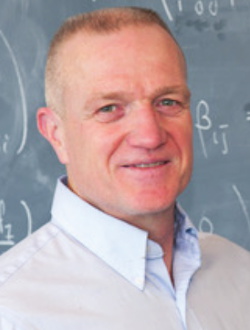University of Miami
Department of Mathematics

Phillip Griffiths Professor of Mathematics
Duke University
will present
From Mechanics, to Algebra, to Geometry:
The Notion of Holonomy
Thursday, March 1, 2018, 5:30pm
Whitten Learning Center 130
Reception to follow the lecture
All interested persons are welcome to attend.
Abstract: Familiar mechanical phenomena, such as driving and parking a car, rolling a ball, and even the ability of falling cats to land on their feet (usually) are examples of an underlying mathematical concept that, in the 19th century, came to be known as "holonomy." As it became better understood, mathematicians and physicists began to realize that holonomy underlay many disparate phenomena, from the everyday situations mentioned above to understanding the curvature of space in Einstein's theory of general relativity. Nowadays, holonomy lies at the heart of both deep mathematical objects and high-energy physical theories, such as string theory and the still-mysterious M-theory, on which many theoretical physicists would like to base a "theory of everything."
This talk will discuss some holonomic phenomena in everyday life, explore their underlying commonality, their appearance in more advanced situations, and try to provide some insight into why this idea has turned out to be so fundamental.
Robert Bryant is the pre-eminent geometer in the tradition of Élie Cartan and S.S. Chern. His research centers around the geometry of differential equations, especially those that arise from particularly interesting geometric questions. Among Bryant's many deep and beautifully written papers, those on special holonomy are a landmark that not only settled, in an unsuspected fashion, the most challenging problems in that subject but also they opened up vast new areas in both geometry and physics. His work has been recognized in numerous awards, including election to membership in the National Academy of Sciences. Bryant’s service to the mathematical community has been extensive including serving terms as Director of the Mathematics Sciences Research Institute and President of the American Mathematical Society. Subsequent to receiving his BS at the North Carolina State University and PhD at the University of North Carolina at Chapel Hill, he received both a Sloan Fellowship and a Presidential Young Investigator Award. Bryant has held faculty positions at Rice University, the University of California at Berkeley, and at Duke University where he currently holds a distinguished professorship.
The McKnight-Zame Distinguished Lecture Series is made possible by a generous donation from Dr. Jeffry Fuqua (Ph.D., UM, 1972). These annual lectures are named in honor of Professor James McKnight, who directed Dr. Fuqua's Ph.D. thesis, and Professor Alan Zame, who was a close mentor of Dr. Fuqua.




